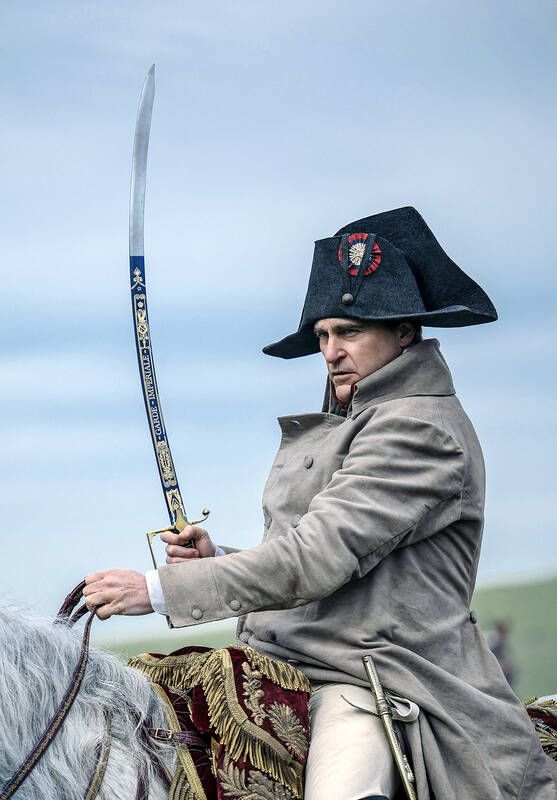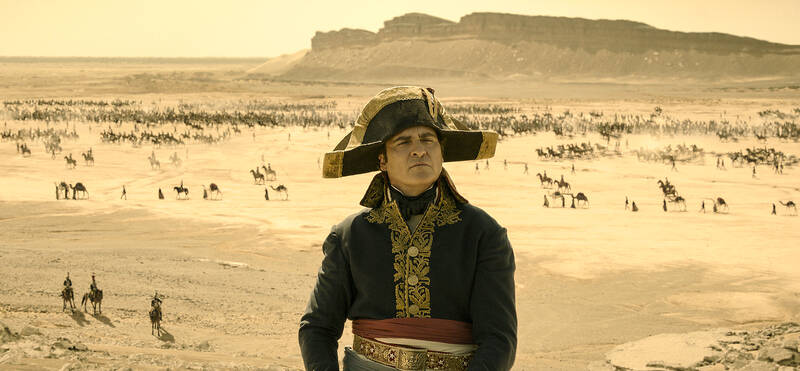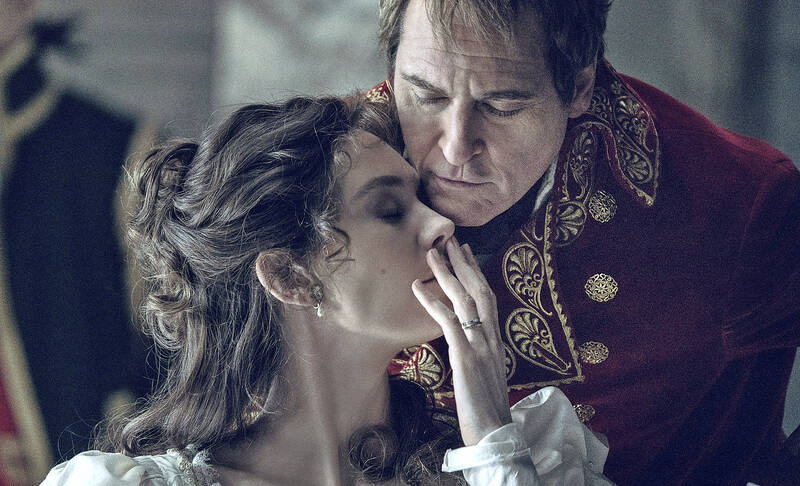“Napoleonic battles are so beautiful. Like vast, lethal ballets… they all have an aesthetic brilliance that doesn’t require a military mind to appreciate.” So said Stanley Kubrick, who had long cherished the ambition of directing a film exploring the life of the Corsican-born artillery officer who rose to become the emperor of France. And Kubrick came close to doing so in the late 1960s, before being forced to abandon the project.
This appreciation of the savage artistry of the great general’s battle strategies is a sentiment that you suspect was shared by Ridley Scott in his approach to Napoleon, a sturdy but uneven historical epic currently in Taiwan theaters that traces the rise and fall of Bonaparte (Joaquin Phoenix), starting with the French Revolution and a not quite historically accurate depiction of the execution of Marie Antoinette, and ending with Napoleon’s death in exile, on the island of Saint Helena. It’s a film that, for all its attempts to show us the man behind the military genius, only fully comes alive on the battlefield.
There’s no question that the combat sequences are impressive. Using numerous cameras, thunderous, enveloping sound and intricate action choreography, Scott manages to convey both the overwhelming tumult of being in the thick of battle and the meticulous efficiency of Napoleon’s strategic planning. It is, not surprisingly, a rather battle-heavy movie, but within this, two sequences in particular stand out.

Photos: AP
The first, a key moment in the young Napoleon’s career, is during the siege of Toulon. British ships (something of a bugbear for Bonaparte throughout his military career, as one unexpectedly funny line reveals) are moored in the harbor. British troops occupy a strategically important fort, from which they amuse themselves by shouting abuse at goats. The catch of Napoleon’s breath is high in the sound mix, making us subliminally aware of the rattled nerves of a young man who has yet to fully prove himself (Napoleon was only 24 at the time, but little attempt is made to de-age Phoenix, who looks solidly middle-aged throughout).
Everything rests on this military operation. Failure, Bonaparte writes in a letter to his brother Lucien (Matthew Needham), will mean that they will be dismissed as “Corsican ruffians unfit for high office.” Fortunately, Napoleon’s nascent brilliance as a commander pays off, with an exhilarating, explosive victory and a promotion, from captain to brigadier general.
Perhaps even more notable is the elegant clarity of Scott’s direction of the decisive victory at the snowbound battle of Austerlitz, regarded by many historians as a tactical masterpiece. In this, and indeed many of the battle scenes, Scott leaches out much of the color (the film veers towards a Napoleonic laundry basket palette of murk and mud throughout), leaving only the throbbing crimson of blood in the icy waters where so many men meet their deaths.

Photos: AP
Like Napoleon himself, the film is rather casual about the sheer scale of loss of life, failing to develop any of the characters of the men in the infantry, the lowly, disposable cannon fodder in Bonaparte’s grand schemes. In fact, the only death that comes close to being mourned by Napoleon is the horse that takes a cannonball to the chest and is blasted from underneath him.
But a man, even a man as combative as Napoleon, amounts to more than the battles he has fought. And it is in this respect that the film is less successful. Unlike Abel Gance’s silent five-and-a-half hour epic Napoleon (1927) — by no small margin still the finest film to tackle the life of Bonaparte — Scott’s picture doesn’t touch on his childhood; Napoleon’s mother’s influence is relegated to a cursory mention and a couple of brief appearances on screen. Phoenix plays up a buffoonish quality in some scenes, a fractious petulance in others, and while this is amusing, it undermines our grasp of other aspects of Bonaparte’s character and gives no clue to the roots of his tenacious pursuit of power.
There are deeper issues with Josephine (the always magnetic Vanessa Kirby), presented here as the key to unlocking Napoleon’s psyche, but who frequently feels jarringly artificial as a character. Josephine is failed by a screenplay (by David Scarp, who also wrote Scott’s next film, Gladiator 2) that views this 18th-century aristocrat through a distorting 21st-century lens. The four-hour director’s cut of Napoleon, which Scott has revealed will stream through Apple TV+ at a later date, may shed a little more light on the man, but is unlikely to iron out the fundamental issues of tone that make Josephine into a dramatic device rather than a woman.

Photo: AP

On April 26, The Lancet published a letter from two doctors at Taichung-based China Medical University Hospital (CMUH) warning that “Taiwan’s Health Care System is on the Brink of Collapse.” The authors said that “Years of policy inaction and mismanagement of resources have led to the National Health Insurance system operating under unsustainable conditions.” The pushback was immediate. Errors in the paper were quickly identified and publicized, to discredit the authors (the hospital apologized). CNA reported that CMUH said the letter described Taiwan in 2021 as having 62 nurses per 10,000 people, when the correct number was 78 nurses per 10,000

As we live longer, our risk of cognitive impairment is increasing. How can we delay the onset of symptoms? Do we have to give up every indulgence or can small changes make a difference? We asked neurologists for tips on how to keep our brains healthy for life. TAKE CARE OF YOUR HEALTH “All of the sensible things that apply to bodily health apply to brain health,” says Suzanne O’Sullivan, a consultant in neurology at the National Hospital for Neurology and Neurosurgery in London, and the author of The Age of Diagnosis. “When you’re 20, you can get away with absolute

May 5 to May 11 What started out as friction between Taiwanese students at Taichung First High School and a Japanese head cook escalated dramatically over the first two weeks of May 1927. It began on April 30 when the cook’s wife knew that lotus starch used in that night’s dinner had rat feces in it, but failed to inform staff until the meal was already prepared. The students believed that her silence was intentional, and filed a complaint. The school’s Japanese administrators sided with the cook’s family, dismissing the students as troublemakers and clamping down on their freedoms — with

As Donald Trump’s executive order in March led to the shuttering of Voice of America (VOA) — the global broadcaster whose roots date back to the fight against Nazi propaganda — he quickly attracted support from figures not used to aligning themselves with any US administration. Trump had ordered the US Agency for Global Media, the federal agency that funds VOA and other groups promoting independent journalism overseas, to be “eliminated to the maximum extent consistent with applicable law.” The decision suddenly halted programming in 49 languages to more than 425 million people. In Moscow, Margarita Simonyan, the hardline editor-in-chief of the